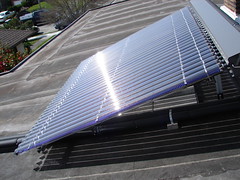 Evacuated tube solar hot water panel much like those providing much of the hot water used every year at LOVESalem HQ. Image by guate84105 via Flickr
Evacuated tube solar hot water panel much like those providing much of the hot water used every year at LOVESalem HQ. Image by guate84105 via Flickr
That's a GREAT idea. As the survey pointed out, Salem gets about the national average in solar energy flux, so we're not nearly as deficient as you might think during a few months in the winter. I'd leap on this in a minute -- if LOVESalem HQ didn't already have a nifty solar hot water heat system provided by Salem's own Ron Summers of Summers Solar. But had NW Natural's offering been available, there's no doubt we'd have gone that way.
This is something we need to see a lot more of from every institution -- utilities especially, but also city and county governments: figuring out ways to get homeowners and renters over the financing barrier that makes renewable energy and efficiency improvements such a high hurdle. The hot water system we installed cost $8100, but the final cost after the federal tax credit, Oregon tax credit, and the Energy Trust of Oregon rebate was only $3700. We were lucky in that we had the cash from a prior home sale available so we could swing the $8100. But not a lot of people have that kind of cash sitting around just after buying a house -- and even those who could swing the $3700 final cost would have cash-flow problems with the up-front $8100.
By setting up a revolving loan fund for renewables and efficiency improvements, Salem could tie payment for the systems to the property tax bill and collection system and wind up helping the whole community, combat economic insecurity, raise property values, provide good local jobs, and reduce the amount of money that leaves the city every month for utilities. What are we waiting for?

![Reblog this post [with Zemanta]](http://img.zemanta.com/reblog_e.png?x-id=fcf622b2-ef39-45e3-ad1e-ac2b4a8b19b6)



